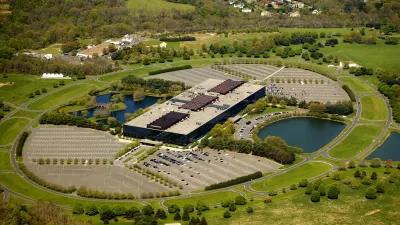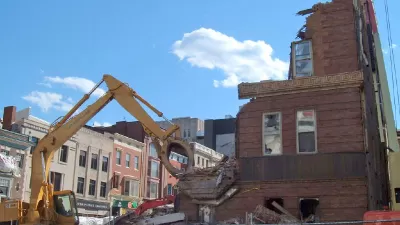The tussle over the historic designation of a property owned by a Chicago church exposes the conflicting agendas of politics, property rights, preservation, and constitutional law.
Faced with a recent reality check on repair costs for its rectory, a Chicago church is now crying foul over a seven-year-old Chicago ordinance that includes the traditional house of residence for its parish priest in a city landmark district.
The Chicago Landmarks Ordinance provides that: "No building that is owned by a religious organization and is used primarily as a place for the conduct of religious ceremonies shall be designated as a historical landmark without the consent of its owner." The church claims the rectory was used in the past for religious ceremonies such as prayer groups and inter-faith weddings, and that it did object at the time the landmark district was being considered.
The rectory is a contributing building to the Logan Square Boulevards district, and the neighborhood Logan Square Preservation group wants to keep the historically significant building in the district and fears that to do otherwise would set a precedent undermining historic preservation districts in general.
Given its setting, the national cliche of Chicago politics enters the debate including arguments about voting, graft and aldermanic privilege in addition to religious freedom, mission and practice (in the same neighborhood where the recent chicken war was flamed). The debate also intersects with a recent constitutional challenge to landmark designation.
Thanks to Lynn Stevens

Planetizen Federal Action Tracker
A weekly monitor of how Trump’s orders and actions are impacting planners and planning in America.

Maui's Vacation Rental Debate Turns Ugly
Verbal attacks, misinformation campaigns and fistfights plague a high-stakes debate to convert thousands of vacation rentals into long-term housing.

San Francisco Suspends Traffic Calming Amidst Record Deaths
Citing “a challenging fiscal landscape,” the city will cease the program on the heels of 42 traffic deaths, including 24 pedestrians.

Defunct Pittsburgh Power Plant to Become Residential Tower
A decommissioned steam heat plant will be redeveloped into almost 100 affordable housing units.

Trump Prompts Restructuring of Transportation Research Board in “Unprecedented Overreach”
The TRB has eliminated more than half of its committees including those focused on climate, equity, and cities.

Amtrak Rolls Out New Orleans to Alabama “Mardi Gras” Train
The new service will operate morning and evening departures between Mobile and New Orleans.
Urban Design for Planners 1: Software Tools
This six-course series explores essential urban design concepts using open source software and equips planners with the tools they need to participate fully in the urban design process.
Planning for Universal Design
Learn the tools for implementing Universal Design in planning regulations.
Heyer Gruel & Associates PA
JM Goldson LLC
Custer County Colorado
City of Camden Redevelopment Agency
City of Astoria
Transportation Research & Education Center (TREC) at Portland State University
Jefferson Parish Government
Camden Redevelopment Agency
City of Claremont




























